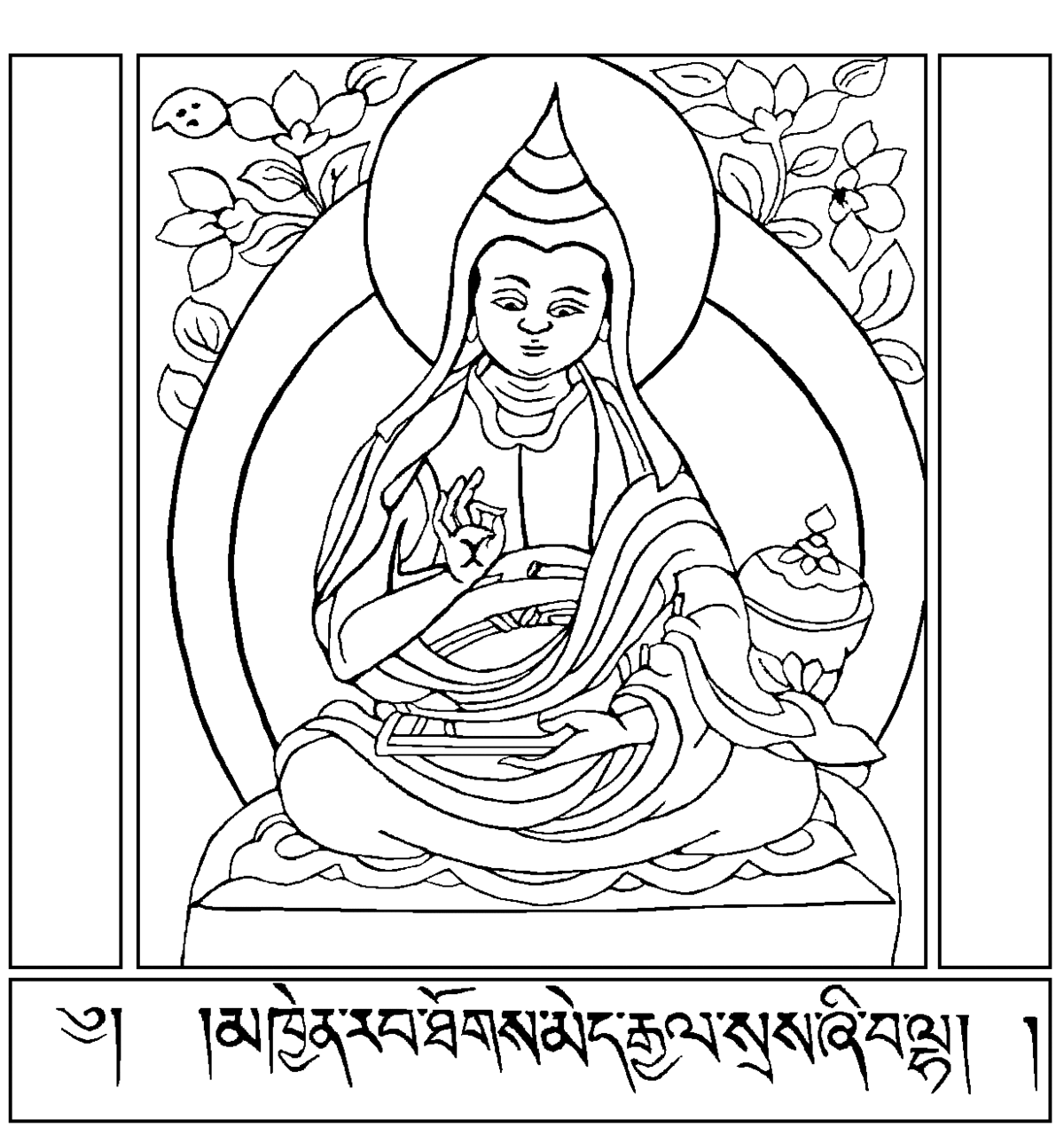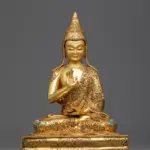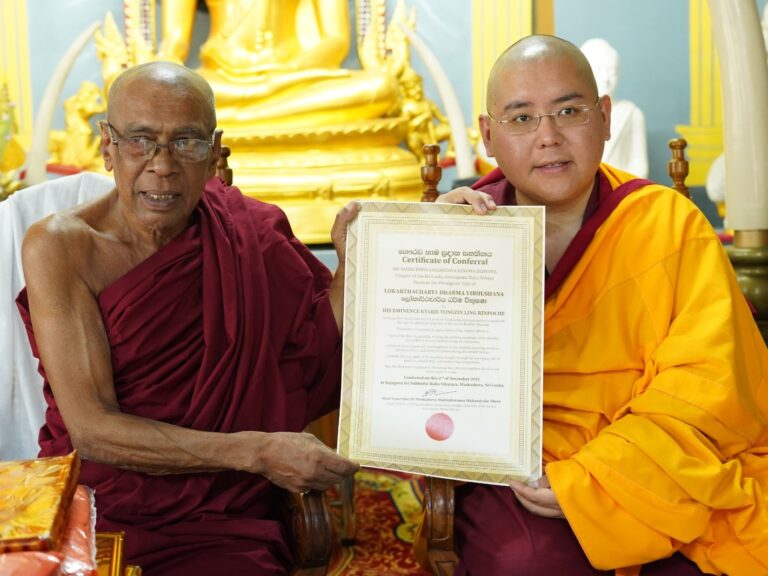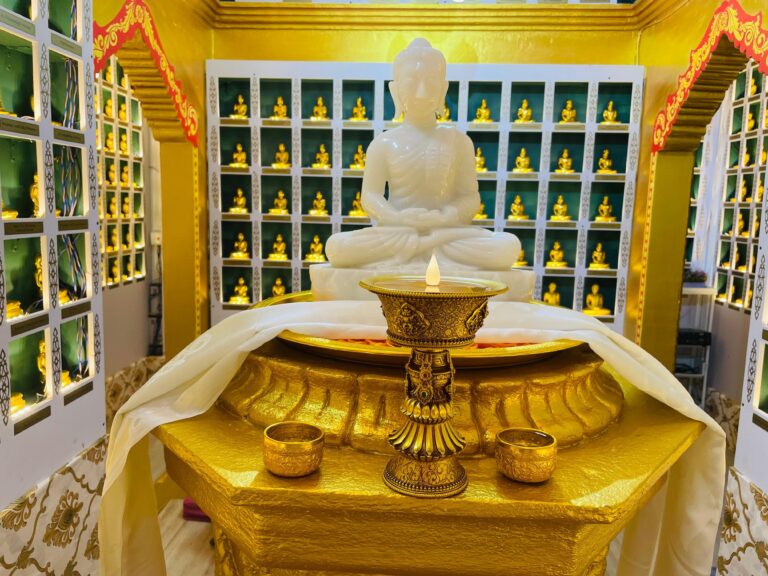His Holiness the 14th Dalai Lama stated in "In Praise of the Seventeen Nalanda Scholars": ངོ་མཚར་རྨད་བྱུང་སྙིང་རྗེ་ཆེན་པོའི་ལམ། ། ཟབ་དང་རྒྱ་ཆེའི་རིགས་ཚུལ་རྣམ་མང་གིས། ། སྐལ་བཟང་གདུལ་བྱའི་ཚོགས་ལ་སྟོན་མཁས་པ། ། རྒྱལ་སྲས་ཞི་བ་ལྷ་ལ་གསོལ་བ་འདེབས། ། You skillfully revealed to the assembly of fortunate disciples the most wondrous and amazing path of great compassion, in so many ways and with reasoning both profound and vast— Bodhisattva Śāntideva, to you I pray! He …
His Holiness the 14th Dalai Lama stated in “In Praise of the Seventeen Nalanda Scholars”:
ངོ་མཚར་རྨད་བྱུང་སྙིང་རྗེ་ཆེན་པོའི་ལམ། །
ཟབ་དང་རྒྱ་ཆེའི་རིགས་ཚུལ་རྣམ་མང་གིས། །
སྐལ་བཟང་གདུལ་བྱའི་ཚོགས་ལ་སྟོན་མཁས་པ། །
རྒྱལ་སྲས་ཞི་བ་ལྷ་ལ་གསོལ་བ་འདེབས། །
You skillfully revealed to the assembly of fortunate disciples the most wondrous and amazing path of great compassion, in so many ways and with reasoning both profound and vast— Bodhisattva Śāntideva, to you I pray!
He was born in the country of Cakravartī, west of Bodhgaya, India. In the eighth century, his father was King Kalyāṇavarman, and his mother was said to be an emanation of Vajrayoginī. He was given the name Shantivarma.
From his childhood, he excelled in his knowledge of all sciences. When he was six, he met an adept who maintained the hidden discipline. He received the empowerment and sadhana of Manjushri and exerted himself in meditation and recitation. Before long, he had a vision of Manjushri, who gave him many instructions.
When the king, his father, died, and the prince, this great being, was requested to ascend the throne, he promised to go to the kingdom without offending the people. The next morning, in a dream, as he was about to sit on a throne, he dreamed that Mañjuśrī was already seated on it and said:
My only son, this is my seat; I am your spiritual friend. It is completely inappropriate for you and me to sit on the same seat.
When he awoke, he thought, “It is not right to enjoy the kingdom,” and he took ordination from Jinadeva, the leader of the five hundred panditas at Nalanda. The name Shantideva was given to him by the abbot, who participated in the ceremony, and he studied the Tripitaka under the abbot, becoming an excellent scholar.
He studied, reflected, and meditated for a long time, receiving continual teachings from Mañjuśrī. He mastered all the transmitted precepts and instructions of the sūtras and tantras. He cut off all external and internal distractions, sat one-pointedly in inner perfect placement, and attained high realizations of the stages and paths. He composed treatises such as the Compendium of Trainings, the Compendium of Sutras, and A Guide to the Bodhisattva’s Way of Life. Inwardly, he progressed through the three kinds of skillful activity of scholars and the higher and higher stages and paths.
He unimpededly engaged in retention, eloquence, clairvoyance, remembering hundreds of thousands of his own and others’ previous lives, and miraculous powers. He participated in the activities of a bodhisattva who is on the higher stages of the path and realization. In his external conduct, apart from eating, sleeping, and defecating, he did not engage in anything else, such as reading and studying scriptures.
The ordinary monks of Nalanda called him “Bhusuku,” “Third Perception,” and criticized him. He remained in this manner for a long time, and the ignorant monks of Nalanda began to discuss among themselves, saying, “This Bhusuku does not contribute any work for the Sangha; it is right that he be expelled.” They thought that they should try something, and they made him recite the text on the first month of the Indian Lunar Calendar, with the deceitful intention of saying that he would undoubtedly be expelled. When many monks pretended to press him, he at first refused, but when he was repeatedly asked, he agreed.
When the abbot Jinadeva heard about this, he said, “Please don’t go to the Dharma assembly. They are going to banish you. It’s better to stay.” The entire saṅgha of Nālandā made the throne to preach and invited the king of the country, intending in fact to embarrass him and let him recite the Dharma.
The master Shantideva asked, “Should I recite something that was already known, or should I teach something that was not known before?” The king said, “Your conduct is completely unprecedented. Please teach a Dharma that has never been heard before.”
The master taught “A Guide to the Bodhisattva’s Way of Life.”
When he arrived at the verse: “When things and nothingness, Are not present before the mind,”
After that, as he continued “A Guide to the Bodhisattva’s Way of Life,” he rose and flew higher and higher into the sky. Finally, his body disappeared, but his voice was heard, and he recited the text uninterruptedly until it was finished, and then he moved away.
Pandits who had mastered the superpower of hearing and the power of retention without forgetfulness compiled the texts. The Kashmiris hold that there are nine chapters, while the followers of Central India hold that there are ten chapters. As it is written in the verses:
“The Compendium of Trainings,
too, must be read repeatedly.
See the Compendium of Sutras.”
People had doubts regarding these two treatises. At one time, these two treatises remained in the south at a stupa called Śrīmatī. “The Compendium of Trainings” and “The Compendium of Sutras” are in the beams of my shed, written in small letters by a paṇḍita. It contained complete instructions for both the Bodhicaryāvatāra (A Guide to Bodhisattva’s Way of Life) and the Compendium of Trainings.
References:
Dalai Lama, H. H. the 14th. (2021, March 12). In praise of the seventeen Nalanda scholars. The Office of His Holiness the Dalai Lama.
Foundation for the Preservation of the Mahayana Tradition. (2012, July). The Seventeen Pandits of Nalanda Monastery. Mandala Publications.
Get in Touch with Us
We’d love to hear from you—share your thoughts or ask a question!






